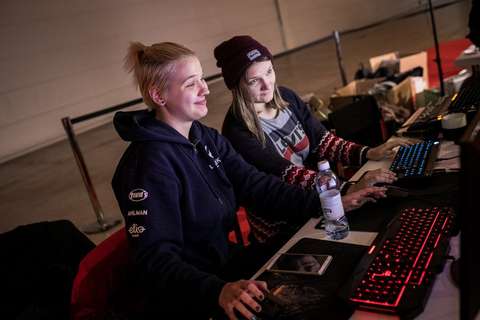Skills for (work)life through gaming ?

Skills for (work)life through gaming?
The city of Espoo is currently coordinating a project that combines digitalization, sports, and exercise. The project includes video gaming, esports, and exergaming. Why is gaming of interest to the city of Espoo?
According to the 2022 Gaming Barometer(external link, opens in a new window), 76 % of young people aged between 10–19 play digital entertainment games weekly or more often, with nearly half playing them daily. Undeniably, gaming is one of the most popular ways for children and young people to spend their free time. To those outside of gaming culture, it may appear as merely increased screen time and rude teenage outbursts during defeat. However, gaming is a pastime that develops skills such as teamwork, tactical thinking, communication, concentration, stress tolerance, and digital skills. While gaming, young people learn skills that are valuable assets in the workplace. Check out the best tips here to understand what gaming can teach you or your young person.
Teamwork
In many digital games, such as multiplayer games or massively multiplayer online role-playing games (MMORPG), players either play together on the same team or compete against each other in groups. Good teamwork is the key to success. Gaming teaches players to recognize their roles in a group and utilize them according to the situation at hand. Good teamwork also requires trust and cooperation between team members. Players must be willing to help each other and collaborate to improve the team's performance and gaming experience. When playing team games, players share common responsibilities and set goals for their actions. These skills are crucial in the workplace.
Tactical thinking
Many digital games require players to make quick decisions and think tactically. One way gaming improves tactical thinking is by teaching players to use their resources more efficiently. Managing resources in the game is important for the game's strategy, such as time limits, money, or characters. Players must learn to use these resources effectively to achieve their goals.
Digital games challenge players' problem-solving skills. Players often have to solve complex problems quickly and creatively to progress in the game. Games often offer various solution options, so players must evaluate different options and choose the best strategy to achieve their goals. In addition, playing digital games requires players to predict their opponents' actions and react quickly to them. Players learn to develop situational awareness and constantly evaluate their opponents' actions, which improves their anticipation skills.
Communication
Multiplayer games require good communication among players, which helps to develop interpersonal skills that are important in many workplaces. Good communication is crucial in digital games so that team members can quickly react to situations and collaborate. Communicating game-related information is particularly important when playing online, where each player is physically in a different location.
One way that playing digital games develops communication skills is through continuous communication during team play. Players learn to use voice messages, chat messages, or other communication tools quickly and effectively to communicate with their team during different stages of the game. They must be able to express their thoughts and feelings clearly and quickly so that the team can react quickly to the opponent's moves. When playing multiplayer games, players learn to adapt their communication style to the situation. They must communicate with their team in demanding situations, playing under stress and pressure. Additionally, digital games can develop players' listening skills. While playing, players must listen to their teammates' instructions and advice and respond quickly.
Concentration and stress management
Concentration and stress management are also crucial in competitive esports. These skills help to develop the ability to perform under pressure, which can be valuable in worklife. Most games have many different stimuli, such as moving targets, sound effects, and visual elements that players must react to quickly. Gaming generally requires good concentration skills because game situations progress quickly and are often unpredictable.
Digital games can also help to develop players' stress management skills as many games contain stressful situations, such as enemy attacks or time limits. Players must learn to manage their emotions and make decisions quickly under pressure, which can help them better cope with stressful situations in life in general.
Digital skills
Esports requires players to have the skill to use various computer software and hardware. This helps to develop digital skills that can be useful in many other tasks. For example, strategy and sports games require players to analyze data and statistics. This helps players develop their data analysis skills and learn how to use data to make decisions. When playing digital games, communication often happens over the network, with chat programs, as well as audio and video calls used as communication tools. This sounds very similar to today's worklife, doesn't it?
Some players also develop their game programming skills by creating their own games or modifying existing ones. This helps to learn programming skills and develop the ability to create their own digital products.